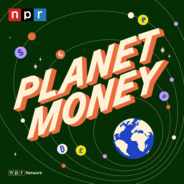After very high inflation, the United States is finally feeling some relief in the form of "disinflation." But, why exactly has inflation slowed down?Three Planet Money hosts try to answer that question while competing to be the winner of our very own reporting challenge: Econ Battle Zone! It's economics journalism meets high-stakes reality TV competition! Will our contestants be able to impress our celebrity judges? How will they manage to incorporate their mystery ingredients? Who will take home the championship belt? Tune in for the inaugural episode of...Econ Battle Zone!This episode was hosted by Keith Romer, Amanda Aronczyk, Erika Beras, and Alexi Horowitz-Ghazi. James Sneed produced this episode with help from Emma Peaslee. The show was edited by Molly Messick, engineered by Cena Loffredo, and fact checked by Sierra Juarez. Alex Goldmark is our executive producer.Help support Planet Money and get bonus episodes by subscribing to Planet Money+ in Apple Podcasts or at plus.npr.org/planetmoney.Learn more about sponsor message choices: podcastchoices.com/adchoicesNPR Privacy Policy

Wirtschaft
Planet Money Folgen
Wanna see a trick? Give us any topic and we can tie it back to the economy. At Planet Money, we explore the forces that shape our lives and bring you along for the ride. Don't just understand the economy – understand the world.Wanna go deeper? Subscribe to Planet Money+ and get sponsor-free episodes of Planet Money, The Indicator, and Planet Money Summer School. Plus access to bonus content. It's a new way to support the show you love. Learn more at plus.npr.org/planetmoney
Folgen von Planet Money
355 Folgen
-
Folge vom 20.01.2024Econ Battle Zone: Disinflation Confrontation
-
Folge vom 17.01.2024Mid-East conflict escalation, two indicatorsOn today's show, we look at two indicators of the economic disruptions of the war in Gaza and try to trace how far they will reach. We start in the Red Sea, a crucial link in the global supply chain connecting to the Suez Canal, with around 15% of the world's shipping passing through it. This includes oil tankers and massive container ships transporting everything from microchips to furniture. With Houthi rebels attacking container ships in solidarity with Palestinians in Gaza, shipping lines are re-routing, adding time and cost to delivery. We look at how ocean shipping is a web more than a chain of links, and try to see which parts of the web can take up more strain as the Red Sea and the Suez Canal become too dangerous to pass. Then, we'll consider what escalation could mean for the region's most important export: oil. Five steps of escalation each mean a ratcheting up of costs that knock on to other industries, like food. Some prices are likely to rise faster than others, though. Help support Planet Money and get bonus episodes by subscribing to Planet Money+ in Apple Podcasts or at plus.npr.org/planetmoney.Learn more about sponsor message choices: podcastchoices.com/adchoicesNPR Privacy Policy
-
Folge vom 13.01.2024The Maine Potato War of 1976When you think of a potato, one state probably comes to mind: Idaho. But for much of American history, Maine was home to the nation's largest potato crop. That status had changed by the 1970s, with the West growing more and more of the nation's potatoes. But Maine still had one distinct advantage: A privileged position in the commodities market. The New York Mercantile Exchange, one of the largest such marketplaces in the country, exclusively dealt in Maine potatoes. And two deep-pocketed Western potato kingpins weren't happy about it. So the Westerners waged what's now called the Maine Potato War of 1976. Their battlefield was the futures market: A special type of marketplace, made up of hordes of screaming traders, where potatoes can be bought and sold before they're even planted. The Westerners did something so bold – and so unexpected – that it brought not only the potato market, but the entire New York commodities exchange, to its knees. Today on the show, how a war waged through futures contracts influenced the kind of potatoes we eat. This episode was hosted by Dylan Sloan and Nick Fountain. This episode was produced by Sam Yellowhorse Kesler with help from Emma Peaslee. It was edited by Molly Messick, engineered by Valentina Rodríguez Sánchez, and fact checked by Sierra Juarez. Our executive producer is Alex Goldmark. Help support Planet Money and get bonus episodes by subscribing to Planet Money+ in Apple Podcasts or at plus.npr.org/planetmoney.Learn more about sponsor message choices: podcastchoices.com/adchoicesNPR Privacy Policy
-
Folge vom 10.01.2024The Universal Basic Income experiment in KenyaThere's this fundamental question in economics that has proven really hard to answer: What's a good way to help people out of poverty? The old-school way was to fund programs that would support very particular things, like buying cows for a village, giving people business training, or building schools.But over the past few decades, there has been a new idea: Could you help people who don't have money by ... just giving them money? We covered this question in a segment of This American Life that originally ran in 2013. Economists who studied the question found that giving people cash had positive effects on recipients' economic and psychological well-being. Maybe they bought a cow that could earn them money each week. Maybe they could replace their grass roofs with metal roofs that didn't need fixing every so often. The success of just giving people in poverty cash has spawned a whole set of new questions that economists are now trying to answer. Like, if we do just give money, what's the best way to do that? Do you just give it all at once? Or do you dole it out over time? And it turns out... a huge new study on giving cash was just released and it's got a lot of answers.Help support Planet Money and get bonus episodes by subscribing to Planet Money+ in Apple Podcasts or at plus.npr.org/planetmoney.Learn more about sponsor message choices: podcastchoices.com/adchoicesNPR Privacy Policy
